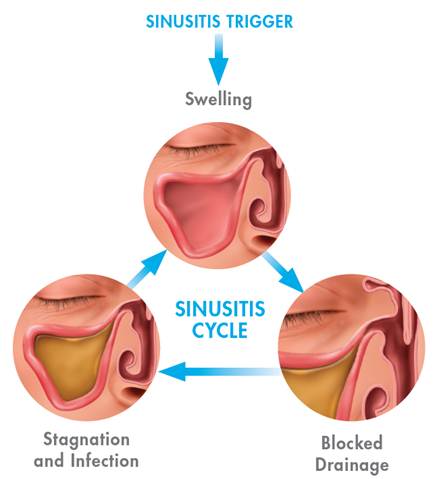Sinusitis
Services
Sinusitis is a common condition that afflicts over 35 million Americans every year.
The sinuses are air-filled spaces behind the forehead, cheeks, and eyes. In healthy sinuses, mucus drains out and air is able to circulate. Sinusitis describes a swelling (inflammation) of the sinuses that can lead to blockages and prevent mucous from draining properly. This can lead to a sinus infection diagnosis when you see the doctor.
All of the physicians at North Fulton ENT are well-versed in the latest treatments, both medical and surgical, for acute and chronic sinusitis.
What Causes Sinusitis?
A number of factors can cause irritation and contribute to sinusitis, including:
- bacteria
- viruses
- fungus
In addition, some studies have shown that structural issues such as narrowed drainage pathways may lead to sinusitis outbreaks.

Common Symptoms of Sinusitis Include:
- Loss of smell or bad breath
- Cough
- Headache and facial pain or tenderness
- Lack of energy
- Nasal congestion and discharge
- Sore throat and postnasal drip
Acute, Chronic, and Recurrent Acute Sinusitis
Sinusitis can be acute, chronic or recurrent acute. Every patient is unique, and requires a personal approach to therapy. Our typical treatment options include:
- Acute—symptoms last 10-12 days—typically addressed via self-care or medical therapy
- Chronic—symptoms last 3 months or longer—can be addressed via medical therapy, an office procedure such as balloon sinus dilation, or functional endoscopic sinus surgery
- Recurrent Acute—multiple acute sinusitis breakouts in calendar year—can be addressed via medical therapy, an office procedure such as balloon sinus dilation, or functional endoscopic sinus surgery
How is Sinusitis Treated?
At North Fulton ENT, we follow the established clinical guidelines for ENT treatment for sinusitis. Our first line treatment is medical therapy—which may include a range of medications designed to address your particular illness and symptoms.
Depending on your needs, our doctors may recommend:
Nasal Steroids for treatment of Sinusitis
Nasal steroid sprays can decrease the swelling in the mucous membrane lining of the sinuses, which can help temporarily relieve symptoms. Some of our patients are reluctant to take medications containing steroids. Steroids can have side effects when taken over a longer period of time. You can find out more about steroid sprays in the package insert, or discuss possible side effects during your visit to North Fulton ENT.
Antibiotics
If sinus inflammation has led to the development of a bacterial infection, we may prescribe antibiotics to deal with symptoms related to that infection.
Decongestant Nasal Drops
Decongestant nose drops or nasal sprays aim to soothe the mucous membranes and reduce swelling. This may make it easier to breathe through your nose.
When medical therapy fails - Advanced treatment options
We see many patients who suffer from chronic or recurrent acute sinusitis for whom medical therapy fails or only provides temporary relief. For these patients, we have developed expertise in more advanced ENT treatment for sinusitis, including:
